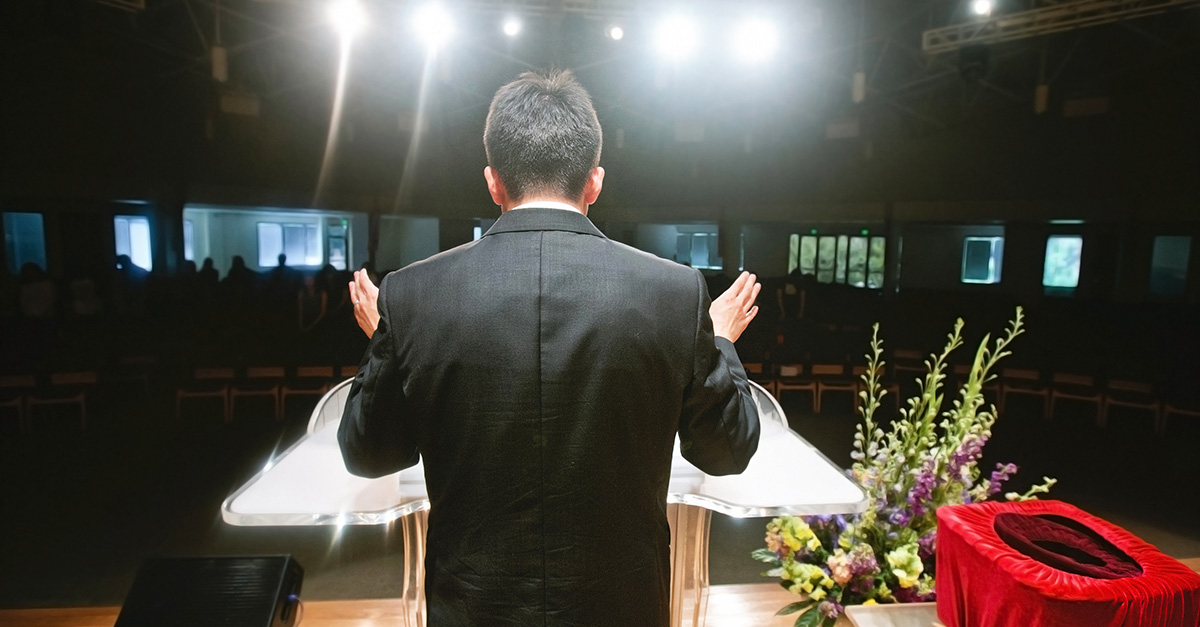


Get a free copy of Parental Rights & Education when you subscribe to our newsletter!

In a word, everything. While pastors should address political issues from a biblical perspective and welcome politicians as worshippers, the pulpit is a place set apart for one message — the supremacy and sufficiency of Jesus Christ.
As election season amps up, churches nationwide have become frequent stops for politicians. Politicians haven’t suddenly become more publicly aligned with their faith; rather, they are invited into sanctuaries to speak directly to congregations, sometimes even during worship services.
Churches are being used as platforms, not for prayer or Scripture reading, but to rally support and make political promises.
Politicians from both parties recognize the Church’s influence, so they capitalize on the pulpit’s visibility to connect with attendees.
In these moments, the local church often becomes a venue for campaign messaging, where promises of hope, prosperity, and change echo through sacred walls.
This trend speaks to a misunderstanding of what the Church exists to do. The Church is not a venue for political theater. It is the Bride of Christ, set apart to proclaim His Gospel, not to elevate mere men.
Pastors must revere the Lord’s Day by reserving the pulpit solely for worshiping God through the preaching of the Gospel. While pastors should address political issues from a biblical perspective and welcome politicians as worshippers, the pulpit must remain protected. It is a place set apart for one message alone — the supremacy and sufficiency of Jesus Christ.
For centuries, the pulpit has held a special place in Christian worship. It is not merely a platform but a sacred trust. Pastors are called to teach, shepherd, and guide through God’s Word. As Paul exhorted Timothy, pastors must “preach the Word; be ready in season and out of season; reprove, rebuke, and exhort, with complete patience and teaching” (2 Timothy 4:2). The pulpit is not the place for promoting earthly saviors or human platforms.
The Church is not a venue for political endorsement but a place for proclaiming Christ crucified, resurrected, and returning. Pastors who allow political figures to take the pulpit risk shifting the focus of the worship service away from God.
Question: Is it wrong for pastors to mention politics in sermons?
Answer: No, it is not wrong, but pastors must frame it biblically. Political issues matter, and pastors are called to help congregants think biblically about them.
The Church must speak to cultural issues, calling believers to live out their faith in all areas of life, including politics. But the pulpit is where pastors must lift up God’s eternal truth, not earthly campaigns. The danger lies in allowing human figures to overshadow the One who holds all power and authority. The pulpit is not a stage for earthly power plays — it is a place where the only agenda is Christ’s.
The theologian Edmund Clowney captures this focus in The Church, wherein he writes,
“The church’s mission is not to gather the masses to a cause or a movement; it is to gather the elect through the proclamation of the gospel of Jesus Christ.”
When pastors invite politicians to take the pulpit, they risk confusing that mission. Believers may begin to equate loyalty to Christ with allegiance to a party, diminishing the Church’s unique role, and risk making it another faction instead of a place set apart.
Question: Is the pulpit different from other platforms?
Answer: Yes, it is. The pulpit is sacred. Unlike other platforms used to promote agendas or personalities, the pulpit is set apart to preach God’s Word. Politicians are welcome in the congregation, but the pulpit must speak with one voice. It must proclaim the supremacy and sufficiency of Jesus Christ.
The pulpit is a symbol of God’s voice speaking to His people. It’s where the Gospel — unchanging and eternal — is preached in an ever-changing world. At a time when politics shift like sand, the message from the pulpit must be a rock. John Calvin wrote,
“When I consider my calling, I submit all the thoughts and feelings of my heart for the sake of Christ and His glory.”
This call to set aside human ambitions and align only with Christ’s glory is the pastor’s duty and the pulpit’s purpose.
When pastors elevate a politician instead of Christ, they compromise the symbol of the pulpit and mislead the congregation. The Church’s witness to the world is diluted when the message in the sanctuary mirrors the agenda outside it. This isn’t a call to ignore the world’s issues, but to see them through the lens of the eternal Gospel. Ultimately, only the Gospel brings true hope, peace, and freedom — not as the world gives but as Christ alone can give.
Pastors take up the call to honor the pulpit and the Lord’s Day. The Church is called to be “a pillar and buttress of the truth” (1 Timothy 3:15), a light in the darkness, and a beacon pointing to Christ.
This is not a call to ignore the reality of the world around us or to sideline the Church’s role in addressing moral and societal issues. Pastors should guide their congregations in engaging with these issues biblically. But let the pulpit remain set apart — a place for God’s Word to reign supreme.
Politicians are welcome in the congregation but not in the pulpit. The pulpit is the place from which pastors proclaim the supremacy and sufficiency of Jesus Christ. No other message will satisfy, transform, or save.
Let the Church’s message remain unchanging: “Jesus Christ is the same yesterday, today, and forever” (Hebrews 13:8). Let the pulpit speak with one voice, proclaiming the power of the Gospel and the sufficiency of Christ.
If you like this article and other content that helps you apply a biblical worldview to today’s politics and culture, consider making a donation here.
